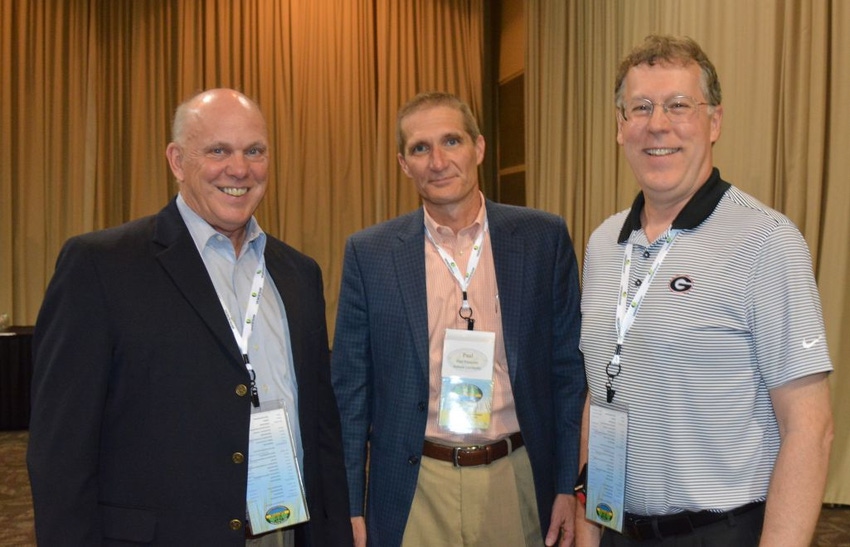
The deans of the Colleges of Agriculture at Auburn University, the University of Georgia and Mississippi State University all agree that higher education will continue to play a vital role in the future of U.S. agriculture.
In a luncheon address to the annual meeting of the Southern Peanut Growers in Destin, Fla. on the role land grant universities play in the survival of agriculture, Dean Paul Patterson of Auburn University, Dean Sam Pardue of the University of Georgia and Dean George Hopper of Mississippi State University all stressed the need for higher education to keep U.S. agriculture competitive. All three emphasized the importance of higher education working in partnership with agriculture.
“At Auburn University we are building. The first thing that we are building is our faculty,” Auburn’s Patterson said. “As we enter the fall semester this year about one-third of our faculty will have been hired in the past three years.”
Building new facilities is also vital at Auburn, Patterson said, citing the new poultry research farm that is now under construction at the Alabama Agricultural Experiment Station located four miles north of the main Auburn campus. In addition, Auburn’s board of trustees has approved a new life science and plant science research building that will replace the aging Funchess Hall. Construction of the new building should begin in two years, Patterson said.
In addition to building its faculty and facilities, Auburn is building its programs, Patterson said. “We are continually evaluating the quality of our programs, continually evaluating if we are incorporating the appropriate technology into our programs and developing the research programs that will lead to the development of new technologies for industry,” he said.
In his comments, the University of Georgia’s Pardue said rising costs, declines in state support, the inability to communicate with the greater public, aging infrastructure and changing demographics present clear challenges to higher education.
“The only thing in the consumer price index that is going up faster than higher education is medical care. We are really squeezing the middle class in this country to be able to send their children to an institution of higher learning,” Pardue said.
“So many of our young people are graduating with significant debt. Some are questioning the value of higher education given the debt that a lot of students leave with,” Pardue said.
The dean cited an article published by the Federal Reserve of San Francisco that asked “is it still worth going to college?” “My answer is absolutely. But I will tell you that there are many who have begin to raise that question that wouldn’t be discussed a decade ago,” Pardue said.
Additionally, a decline in state funding is a challenge all land grant universities are facing, Pardue said.
“In 2002, 47 percent of the University of Georgia’s funding came from state coffers. Today, it’s 27 percent. We had to make up those funds from different sources. That’s not a trend that’s unique to Georgia. That is a trend that is at North Carolina State and everywhere I have been,” Pardue explained.
Also, the trend where fewer young men are enrolling in the college of agriculture concerns Pardue. He said 17 years ago roughly 41 percent of the student body in the College of Agriculture was female and today it is over 60 percent. This trend is not unique to the University of Georgia, he added.
Mississippi State’s Hopper said the College of Agriculture is emphasizing precision agriculture in its programs. Over the past two years, the college filled seven new precision agriculture faculty positions across four departments, Hopper said.
“We developed a new precision ag certificate across four majors in ag business, ag engineering plant sciences, entomology and plant pathology,” he explained.
Finally, Hopper urged the audience to encourage young people they know to study agriculture when they go to college.
“If you have a son or a daughter or a grandson or a granddaughter or a niece or a nephew and they say to you ‘I’m thinking about going and majoring in agriculture.’ Don’t talk them out of it. Please don’t say ‘don’t do that, that’s a terrible idea.’ There’s a really good chance that they said that because they want to follow in your footsteps,” he emphasized.
About the Author(s)
You May Also Like






